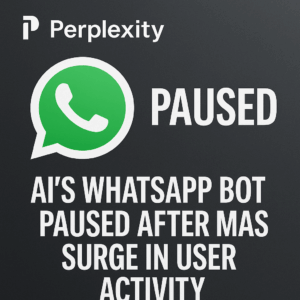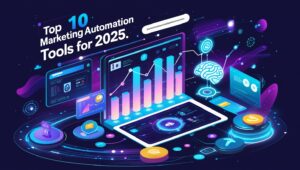As we look toward 2025, the role of artificial intelligence in marketing continues to expand, shaping how brands engage with their audiences. The emergence of new AI tools for digital marketing 2025 highlights the necessity for marketers to evolve alongside these innovations. This article serves as a comprehensive guide, providing insights into the most promising digital marketing automation tools that harness AI capabilities. By incorporating artificial intelligence in marketing strategies, businesses can drive efficiency, enhance personalized experiences, and leverage data-driven decisions to optimize their marketing campaigns. Stay ahead in an ever-evolving landscape by understanding these transformative tools.
Table of Contents
ToggleKey Takeaways
- The increasing adoption of AI tools is vital for staying competitive in digital marketing.
- Digital marketing automation tools streamline processes and enhance campaign effectiveness.
- Artificial intelligence drives personalized customer experiences and targeted strategies.
- Marketers must continuously adapt to emerging AI technologies to optimize results.
- Data-driven decisions powered by AI can significantly improve marketing ROI.
The Rise of Artificial Intelligence in Marketing
The emergence of artificial intelligence in marketing marks a pivotal shift in the industry’s landscape. With organizations increasingly adopting AI technologies, a notable digital marketing transformation is underway. This integration is not only optimizing marketing efforts but also refining customer targeting and enhancing the analysis of large datasets.
Recent AI trends in marketing highlight the growing reliance on automation within campaigns. These advancements enable marketers to streamline repetitive tasks while allowing for deeper engagement with consumers. The ability to gather and analyze customer insights in real-time fosters a more personalized marketing approach, catering to individual preferences and behaviors.
As AI continues to revolutionize traditional marketing strategies, the relationship between brands and consumers evolves. Enhanced data capabilities allow companies to anticipate customer needs better and create tailored experiences. This evolution exemplifies how artificial intelligence in marketing is reshaping consumer interactions and helping brands remain competitive in a rapidly changing marketplace.
The Importance of AI Tools in Digital Marketing
The modern landscape of digital marketing underscores the importance of AI tools in driving successful campaigns. These technologies play a pivotal role in optimizing various processes and enhancing overall performance. From predictive analytics to real-time campaign adjustments, AI tools deliver measurable results that are indispensable for contemporary marketers.
Studies demonstrate that businesses employing AI tools for digital strategies significantly outperform competitors. This advantage arises from the ability to analyze large datasets quickly, enabling marketers to make informed decisions and target audiences more effectively. The role of AI in marketing extends beyond mere automation; it revolutionizes customer segmentation and personalizes outreach efforts, thereby increasing engagement.
As digital marketing continues to evolve, incorporating AI tools has transitioned from an optional enhancement to a necessary strategy. Companies that embrace these innovations not only streamline their operations but also position themselves ahead in a crowded marketplace. The synergy between AI and digital marketing strategies showcases the transformative potential of AI, solidifying its status as a cornerstone of effective marketing solutions.
Top AI Tools for Digital Marketing 2025
The landscape of digital marketing is evolving rapidly, with numerous AI tools emerging to enhance efficiency and precision. This section explores the top AI tools for digital marketing 2025, examining their key features and how they stand out in the competitive marketplace. Understanding the features of AI marketing tools provides marketers a clearer perspective on which tools best meet their needs.
Highlighting Key Features of Each Tool
Each tool on this curated list offers unique elements designed to streamline marketing processes:
| Tool Name | Key Features | Analytics Capabilities | Automation Options |
|---|---|---|---|
| HubSpot | Comprehensive CRM, Email marketing, Content management | Advanced reporting and dashboards | Email automation and workflow triggers |
| Salesforce Einstein | Predictive analytics, AI-powered insights | Detailed audience segmentation | Lead scoring and automated email responses |
| Hootsuite Insights | Social media monitoring, Influencer analytics | Real-time engagement tracking | Post scheduling and auto-responses |
User Reviews and Feedback
User experiences with AI tools reveal crucial insights into their effectiveness. Feedback from marketers highlights satisfaction with HubSpot’s user-friendly interface and robust analytics capabilities. Salesforce Einstein receives praise for its predictive capabilities that significantly enhance marketing strategies. Hootsuite Insights is celebrated for its social listening features, which allow for prompt reactions to emerging trends.
Digital Marketing Automation Tools Overview
Digital marketing automation tools play a crucial role in streamlining marketing efforts and enhancing efficiency. Platforms such as Mailchimp, Marketo, and ActiveCampaign lead the industry by offering features that simplify tasks like email marketing, social media management, and lead nurturing. These tools save valuable time by automating repetitive tasks, allowing marketers to focus on strategic initiatives.
Research indicates that companies that utilize digital marketing automation tools often experience notable improvements in lead conversion rates and overall campaign performance. The integration of AI in automation further enhances these tools, providing advanced analytics and insights that empower marketers to tailor their strategies effectively. For instance, AI capabilities can predict customer behavior and optimize marketing campaigns in real time.
The benefits of marketing automation extend beyond efficiency. They include improved targeting of audiences, enhanced personalization in communications, and a better overall customer experience. As the landscape of digital marketing continues to evolve, the adoption of automation tools equipped with AI technology will become increasingly vital for businesses aiming to stay competitive.
Understanding AI Technologies for Online Marketing
Online marketing is increasingly shaped by the advent of AI technologies, particularly through the implementation of machine learning in advertising. These technologies enable marketers to harness vast amounts of data, facilitating a more strategic approach to customer engagement and advertising effectiveness.
Machine Learning for Digital Advertising
Machine learning algorithms analyze consumer data to uncover patterns and trends. This capability significantly alters advertising strategies, allowing for automation in areas such as bidding during online ad auctions. By predicting customer behavior, businesses can better tailor their campaigns to meet audience preferences.
Leading brands have already embraced these advancements, successfully optimizing ad targeting and improving their return on investment (ROI). Notable examples include:
- Amazon utilizes machine learning to recommend products based on customer browsing history.
- Netflix applies similar methods to personalize viewing suggestions, enhancing user experience.
- Google Ads employs machine learning to refine ad placements, maximizing relevance and user engagement.
The benefits of machine learning extend beyond mere data analysis. These advantages include:
- Increased ROI through targeted marketing efforts.
- Improved customer targeting by understanding preferences.
- Enhanced campaign personalization that resonates with audiences.
Organizations that adopt these AI technologies for online marketing stand to gain significant competitive advantages by leveraging the benefits of machine learning. The landscape of digital advertising is evolving rapidly, and those who integrate these tools will likely see more substantial results from their marketing efforts.
Future of AI in Digital Marketing
The future of AI in digital marketing looks promising, with many exciting developments on the horizon. As we approach 2025, various AI predictions indicate that businesses will experience significant advancements in natural language processing. This technology will enable marketers to create more tailored content that resonates with their target audiences.
Another critical aspect of upcoming trends in AI marketing involves enhanced personalization. AI algorithms will analyze consumer data more effectively, allowing companies to deliver customized experiences based on individual preferences and behaviors. Marketers can expect to use these insights to drive engagement and improve conversion rates.
Research highlights the increasing adoption of chatbots for customer engagement. These intelligent tools provide real-time support, enhance user experience, and gather valuable data for marketers. As businesses look to streamline their operations, chatbots will become integral to customer service strategies.
Furthermore, the use of data analytics will evolve, empowering marketers to predict consumer trends and behaviors with more confidence. Advanced analytics will enable insights that lead to proactive marketing strategies, positioning businesses well ahead of their competitors.
Ethical considerations surrounding data privacy will remain a focal point. As AI technologies are adopted more widely, companies need to prioritize transparent practices to maintain consumer trust while navigating the future of AI in digital marketing.

How AI Enhances Predictive Analytics for Digital Campaigns
AI technologies have transformed the way marketers approach predictive analytics for digital campaigns. By harnessing vast amounts of data, these innovative tools enable businesses to predict customer behavior more accurately. This leads to improved targeting and enhanced campaign effectiveness. As companies strive to craft engaging experiences, understanding how AI powers predictive analytics becomes essential.
Real-World Applications of Predictive Analytics
The applications of AI tools in predictive analytics extend across various marketing functions. Here are some notable implementations:
- Targeted Advertising Campaigns: By analyzing historical customer data, AI can identify patterns that help marketers tailor advertisements to specific audience segments.
- Customer Churn Analysis: Predictive analytics enables businesses to foresee which customers are likely to leave, allowing for proactive engagement strategies to retain them.
- Dynamic Pricing Strategies: Companies use AI in predictive analytics to adjust prices in real-time based on demand fluctuations and competitive pricing.
Several case studies highlight the successful integration of predictive analytics through AI, demonstrating the tangible benefits these advanced tools can bring to businesses. By leveraging predictive insights, marketers can optimize their strategies, leading to better customer engagement and increased conversion rates.
Advanced Marketing Tools for 2025
The landscape of digital marketing continues to evolve rapidly, largely driven by innovative marketing solutions. As we approach 2025, new AI marketing trends are emerging, paving the way for cutting-edge tools that will redefine how businesses engage with their customers. Key areas of focus include AI-driven content creation platforms, advanced customer relationship management systems, and next-gen analytics technology.
AI-driven content creation tools are expected to enhance efficiency in generating personalized content at scale. These tools leverage machine learning to analyze audience preferences, delivering relevant content that resonates with targeted demographics. The development of personalized marketing messages will improve customer engagement and elevate brand loyalty.
Advanced customer relationship management systems are equipped with AI capabilities, offering profound insights into customer behaviors and needs. These platforms will facilitate enhanced tracking of customer interactions and automate responses, resulting in streamlined communication and improved customer satisfaction.
Next-gen analytics platforms will harness vast amounts of data to provide businesses with actionable insights. By analyzing trends and consumer behavior, these systems will empower marketers to make informed decisions swiftly. Businesses can anticipate shifts in market dynamics and tailor their strategies accordingly, which is essential in an ever-changing marketplace.

Industry experts anticipate that the integration of these advanced marketing tools will transform marketing strategies. Companies need to prepare by investing in training and resources that align with these innovative marketing solutions. Adopting these tools effectively will crucially determine an organization’s competitive advantage in the coming years.
| Tool Type | Features | Benefits |
|---|---|---|
| AI Content Creation | Automated content generation, Personalization | Enhanced engagement, Scalability |
| CRM Systems | Behavior tracking, Automated responses | Improved customer satisfaction, Streamlined communication |
| Analytics Platforms | Data analysis, Predictive insights | Informed decision-making, Proactive strategy adjustment |
Benefits of Integrating AI Tools into Marketing Strategies
In today’s fast-paced digital landscape, the benefits of AI integration in marketing strategies cannot be overstated. Businesses leveraging AI tools for marketing strategy experience significant enhancements in various areas. One primary advantage is the improvement in efficiency. By automating repetitive tasks, companies can focus on more strategic initiatives, thereby maximizing their productivity.
Data-driven decision-making stands out as another essential benefit. AI tools analyze vast amounts of data, providing marketers with actionable insights that inform their campaigns. This leads to enhanced customer experiences, as personalized marketing efforts become more effective. Customers receive tailored messages that resonate with their preferences and behaviors, ultimately fostering greater engagement.
A statistic illustrating the success of AI integration is a reported increase in ROI for companies employing these tools. Real-world examples demonstrate how organizations have achieved remarkable growth and customer satisfaction through thoughtful AI adoption. This progress highlights the competitive advantages of AI over traditional marketing methods.
Incorporating AI tools into marketing strategies not only drives efficiency and personalization but also establishes a clear edge in a crowded marketplace. The shift towards AI is no longer an option but a necessity for brands aiming to thrive.
Challenges and Considerations When Adopting AI
The integration of AI into marketing strategies presents a unique array of challenges that organizations need to navigate. One of the primary challenges of adopting AI includes the substantial costs associated with advanced technologies. Many companies face financial constraints that can impede their ability to invest in essential AI tools.
Another significant hurdle involves the need for comprehensive employee training. Understanding the intricacies of AI systems demands that staff members enhance their skill sets. Organizations must commit to ongoing education to ensure successful considerations for AI marketing.
Data privacy and ethical concerns have emerged as critical issues as well. Companies must carefully evaluate their data management practices to prevent potential breaches and misuse. Adhering to regulations while implementing AI tools adds another layer of complexity, highlighting the barriers to AI implementation.
| Challenge | Potential Solution |
|---|---|
| High Costs of Technology | Explore scalable options and seek funding or partnerships. |
| Need for Employee Training | Implement ongoing professional development programs. |
| Data Privacy Concerns | Establish robust data governance frameworks. |
| Complex Implementation Process | Engage with experienced consultants to streamline integration. |
Addressing these challenges is crucial for organizations aiming to effectively utilize AI capabilities within their marketing efforts. By recognizing and understanding the considerations for AI marketing, businesses can better prepare for a successful adoption process. With the right strategies and preparedness, overcoming the barriers to AI implementation becomes more manageable.
Conclusion
In summary of AI in digital marketing, the integration of artificial intelligence tools has become essential for businesses aiming to thrive in an increasingly competitive landscape. These innovative technologies not only streamline operations but also enhance customer experiences, making marketing strategies more effective and targeted. As we’ve explored, the future of AI marketing holds vast potential, empowering organizations to harness data-driven insights for more intuitive decision-making.
Moreover, the adoption of AI tools is not without its challenges. Understanding the nuances of these technologies is crucial for marketers to leverage their full capabilities. Companies that stay informed about emerging trends and commit to investing in AI solutions will likely gain a significant competitive edge as the digital landscape continues to evolve.
As we look forward to a future where AI becomes deeply integrated into marketing strategies, it is evident that the potential for innovation and growth is boundless. Embracing this shift will not only benefit businesses but will redefine customer engagement, setting new standards for the industry at large.
FAQ
What are the benefits of using AI tools for digital marketing in 2025?
AI tools offer numerous benefits, including improved efficiency through automation, enhanced customer experiences via personalized marketing efforts, and data-driven decision-making that optimizes campaign performance. This results in better lead conversion rates and higher ROI.
How is artificial intelligence changing the landscape of digital marketing?
Artificial intelligence is revolutionizing digital marketing by enabling more precise customer targeting, improving data analysis capabilities, and facilitating automation. These advancements enhance marketers’ ability to connect with consumers, leading to more effective campaigns and higher engagement rates.
What are the top digital marketing automation tools expected to dominate in 2025?
Some of the leading digital marketing automation tools projected for 2025 include HubSpot, Marketo, and Salesforce. These platforms streamline processes like email marketing, lead nurturing, and social media management, significantly improving campaign performance.
How does machine learning contribute to digital advertising?
Machine learning allows for analyzing vast datasets to identify consumer behavior patterns, which enhances ad targeting and optimizes bidding strategies. As a result, marketers can achieve better ROI and personalization in their advertising efforts.
What role does predictive analytics play in digital marketing campaigns?
Predictive analytics leverages historical data to forecast future consumer behaviors and trends. This enables marketers to optimize their campaigns by targeting the right audience at the right time, improving engagement, and reducing customer churn.
What are some emerging trends in AI technologies for online marketing?
Emerging trends for AI in online marketing include advancements in natural language processing, increased use of chatbots for enhanced customer engagement, and more personalized marketing strategies that are data-driven and consumer-focused.
What challenges might businesses face when adopting AI tools in their marketing?
Businesses may encounter challenges such as the high costs associated with AI technologies, the need for employee training to use these tools effectively, and concerns about data privacy and ethical implications surrounding AI usage.
How can companies ensure the successful integration of AI into their marketing strategies?
Companies can ensure successful integration by conducting thorough research on AI tools, providing employee training, and developing a strategic plan that addresses both potential challenges and resource allocation, facilitating seamless adoption and maximizing benefits.
Which companies have successfully implemented AI tools in their marketing strategies?
Several notable companies, including Amazon and Netflix, have successfully integrated AI tools into their marketing strategies. By employing advanced analytics and machine learning, they have significantly enhanced customer experiences, optimized advertising, and driven impressive ROI.











